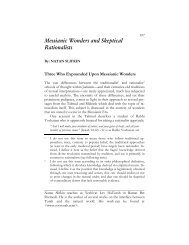Is There a Disconnect between Torah Learning and ... - Hakirah.org
Is There a Disconnect between Torah Learning and ... - Hakirah.org
Is There a Disconnect between Torah Learning and ... - Hakirah.org
Create successful ePaper yourself
Turn your PDF publications into a flip-book with our unique Google optimized e-Paper software.
<strong>Is</strong> there a <strong>Disconnect</strong> <strong>between</strong> <strong>Torah</strong> <strong>Learning</strong> <strong>and</strong> <strong>Torah</strong> Living? : 23<br />
Although, as I have already said, this “disconnect” <strong>between</strong><br />
learning <strong>Torah</strong> <strong>and</strong> living <strong>Torah</strong> is perhaps most obvious in issues of<br />
(person-to-person dealings), <strong>and</strong> somewhat less visibly בין אדם לחבירו<br />
in issues בין אדם למקום (person-to-G-d dealings), the “disconnect”<br />
exists there as well. As the Chazon <strong>Is</strong>h 16 writes, the one overriding<br />
that a <strong>Torah</strong>-true Jew must have is self-control. To the degree מדה<br />
that one has it, one has it in all areas of life. To the degree that one<br />
lacks it, one lacks it in all areas of life. If one seems to have selfcontrol<br />
in one area, e.g. in the area of אדם למקום ,בין but does not<br />
have self-control in areas of אדם לחבירו ,בין then it is an illusion. It<br />
seems so only because the מצוות בין אדם למקום have not “stepped on<br />
his toes” (e.g. kosher meat is easily available, Shabbos is a pleasure),<br />
while people do step on his toes constantly. Such a person will<br />
transgress עבירות בין אדם למקום as soon as they “step on his toes.”<br />
We say in our daily tefilos,<br />
—“<strong>and</strong> you taught them (our forefathers) a living <strong>Torah</strong>, to do your<br />
will wholeheartedly.” <strong>Torah</strong> is meant to be a living <strong>Torah</strong>, a guide for<br />
life. How can we better connect the two—<strong>Torah</strong> <strong>and</strong> Life?<br />
In Search of an Answer:<br />
ותלמדם חוקי חיים לעשות רצונך בלבב שלם<br />
I would suggest that the disconnect <strong>between</strong> learning <strong>and</strong> living in<br />
the area of middos needs to be addressed at four different levels. Each<br />
of these involves some misconceptions we have about the<br />
development of character traits <strong>and</strong> behavioral controls, or some<br />
misconception or deliberate f<strong>org</strong>etting of its importance. The first<br />
three speak specifically to <strong>Torah</strong> <strong>and</strong> middos; the fourth addresses<br />
connecting <strong>Torah</strong> <strong>and</strong> living in a more general way.<br />
ועכ "פ לא יתקוטט עמהם מפני שמדת העזות מגונה מאד ואין ראוי<br />
להשתמש ממנה כלל אפילו בעבודת הש"י כי יקנה קנין בנפשו להיות עז אפילו שלא<br />
comments:<br />
“But he should, in any case, not enter into . "ל<br />
disputes with them, for audacity is a very despicable trait <strong>and</strong> should<br />
not be used in the service of Hashem, because the person is likely to<br />
become habituated to the trait <strong>and</strong> use it even in his daily dealings with<br />
others.” This fear of becoming habituated to negative behavior patterns<br />
is well-established in our tradition. Why do we f<strong>org</strong>et this in the cases<br />
described?<br />
במקום עבודתו ית' ועיין בבה<br />
ספר אמונה ובטחון פרק ד סעיפים א 16<br />
, -ו<br />
.
















